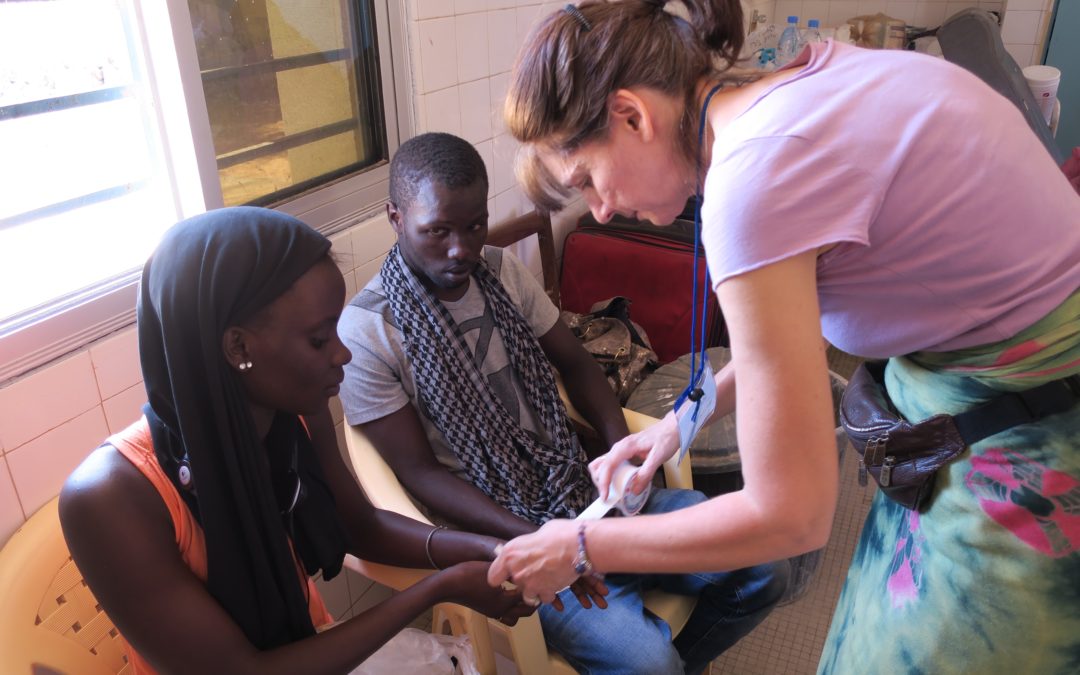
by Mission Partners For Christ | Aug 25, 2023 | What We Do
If you’ve ever looked into going on a medical mission trip, you’ve probably wondered if the cost participants pay is worth it. The costs may be higher than other types of mission trips, but so are the benefits.
 When you join a medical missions team, it’s normal for participants to pay for flights, accommodations, and food during the trip. Most organizations (but not us!) also ask participants to pay extra to cover the supplies needed to conduct medical exams or to leave with the patients.
When you join a medical missions team, it’s normal for participants to pay for flights, accommodations, and food during the trip. Most organizations (but not us!) also ask participants to pay extra to cover the supplies needed to conduct medical exams or to leave with the patients.
But despite those expenses, there are three key reasons why medical missions trips are worth the cost:
- 1.Medical mission trips provide additional training for students outside of the regular classroom.
There are so many things that cannot be taught within the walls of a classroom. Some of the first people to sign-up for medical missions opportunities are students because they can finally use their knowledge in a situation that isn’t hypothetical. Students can not only see the global healthcare needs up close but also serve through hands-on experiences that make a difference! Now, this isn’t to say that volunteers should use a medical missions trip to experiment or put patients at risk by doing more than they’re trained to do. It’s simply an opportunity to experience more and serve those in need.
- Medical mission trips have a transformational impact.
Short-term missions trips aren’t always equally beneficial between the communities served and the volunteers. The lasting transformations happen from building relationships, and that can’t always occur in a couple of weeks time. Of course, sharing the message of Jesus is the biggest gift you can give someone, but what’s impactful about short-term medical missions trips is that the few short weeks are enough time to change a person’s life spiritually and physically — leaving a transformational impact on those served.
- Healthcare professionals can further develop their skills.
Certain diseases or medical needs are prevented in the states but still exist overseas. For example, thousands of people in Tanzania test positive for malaria each year.
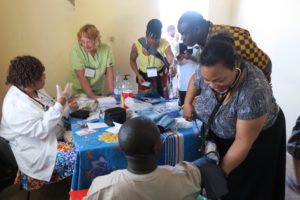 In the US we often have more than enough resources and an optimal environment to treat patients. When volunteers put their skills to use in less than ideal conditions with little resources, they are developing their skill sets, providing great care, and gaining a positive learning experience in the process.
In the US we often have more than enough resources and an optimal environment to treat patients. When volunteers put their skills to use in less than ideal conditions with little resources, they are developing their skill sets, providing great care, and gaining a positive learning experience in the process.
When the costs for a medical missions trip seems overwhelming, remember that there are ways to raise money such as crowdfunding and fundraising opportunities with organizations such as Volunteer Forever (https://www.volunteerforever.com/). Volunteer Forever offers scholarship opportunities that allow volunteers to serve on medical missions trips no matter the expense.
And when it comes down to it, what price would you put on offering life-saving preventions and interventions to people in need? Medical missions trips are always worth the cost.
Ready to join a team? Click here for information on upcoming trips!

by Mission Partners For Christ | May 26, 2023 | How to Prepare
You find yourself called to a medical missions trip, but you want to make sure you are prepared and equipped before you find yourself overwhelmed and in over your head. You may have all the medical knowledge needed, but what about spiritual knowledge? A great way to prepare before you leave on your trip is to not only prepare your heart but to prepare your mind with these eight book suggestions to read before your medical mission’s trip!
- Serving with Eyes Wide Open: Doing Short-Term Missions with Cultural Intelligence by: David Livermore
Although many are involved in short-term missions experiences all around the world, there’s always improvements to be made to the approach and practice of missions trips. Many times we want to bring our culture to other places in the world instead of bringing Christ and adapting to the culture that’s already there. This book will help the reader to serve with cultural sensitivity and intelligence.
- Cross-Cultural Servanthood: Serving the World in Christlike Humility by: Duane Elmer
When the author went around the world asking what people thought about missionaries, the response showed him that Christian missionaries came across less than humble. In fact, they came across arrogant. Obviously, this approach was hurting their impact. Actions that were meant to be loving instead came across as pretentious and superior. In his book, Elmer gives advice about how to serve with humility and avoid misunderstanding other cultures. To serve effectively around the globe, read this book before your next mission’s trip.
- Multicultural Manners: Essential Rules of Etiquette for the 21st Century by: Norine Dresser
When traveling overseas, you will quickly learn that it’s not easy to understand the etiquette of a new cultural. This book will help address appropriate interactions around the world when it comes to greeting one another, hand signals that mean different things globally, and how to avoid embarrassment with each new interaction. This book is informative and will give you the courage you need to approach a culturally different community respectfully.
- When Helping Hurts: How to Alleviate Poverty Without Hurting the Poor…and Yourself. by: Steve Corbett, Brian Fikker
Donations and handouts are typically our response to poverty. It helps us feel as if we are making an impact without having to get our hands dirty. But what if our handouts and donations were fueling the problem? Poverty is complex and deserves consideration to truly alleviate the problem. Those in poverty need empowerment and ways to sustain themselves rather than relying on those around them. Sustainable change must happen from the inside out. This book will give you a new perspective on how to help alleviate poverty in ways that are long lasting!
- Medical Missions: Get Ready, Get Set, Go! by: Bruce Steffes
This book recognizes that medical missions are different than other short-term mission trips. Practicing medicine in areas with very little supplies in conditions that are less than ideal is difficult. This book will help those involved in medical missions trips know what to expect and receive tips on how to be more effective! Read the stories about the author’s personal experiences and feel more prepared with his advice and insights. This is a must-read book that can also be slipped into your pocket to take with you for encouragement on the field!
- Let the Nations Be Glad!: The Supremacy of God in Missions by: John Piper
This book gives readers a biblical basis for missions, why it’s important for the expansion of the Gospel, and the importance to reach all nations! Preparing for a medical missions trip requires the understanding of the spiritual mission as well. Read this book to be ready for the spiritual work!
- Preach and Heal: A Biblical Model for Missions by: Charles Fielding
This book teaches why it’s important to both preach and heal. If you don’t meet the physical needs of a person, how can you expect he/she to accept the spiritual need? It’s important not to walk away from healing while leaving a person spiritually dry. Ministry must be balanced to be effective.
Preparing yourself for your medical missions trip is essential. Choose a few books from this list, and watch yourself benefit from the knowledge and preparation before your big adventure!
See you in the mission field!

Sheri Postma, RN
Founder & CEO
Mission Partners for Christ
MissionPartnersforChrist.com
Facebook.com/MissionPartnersforChrist
Twitter.com/mission_partner
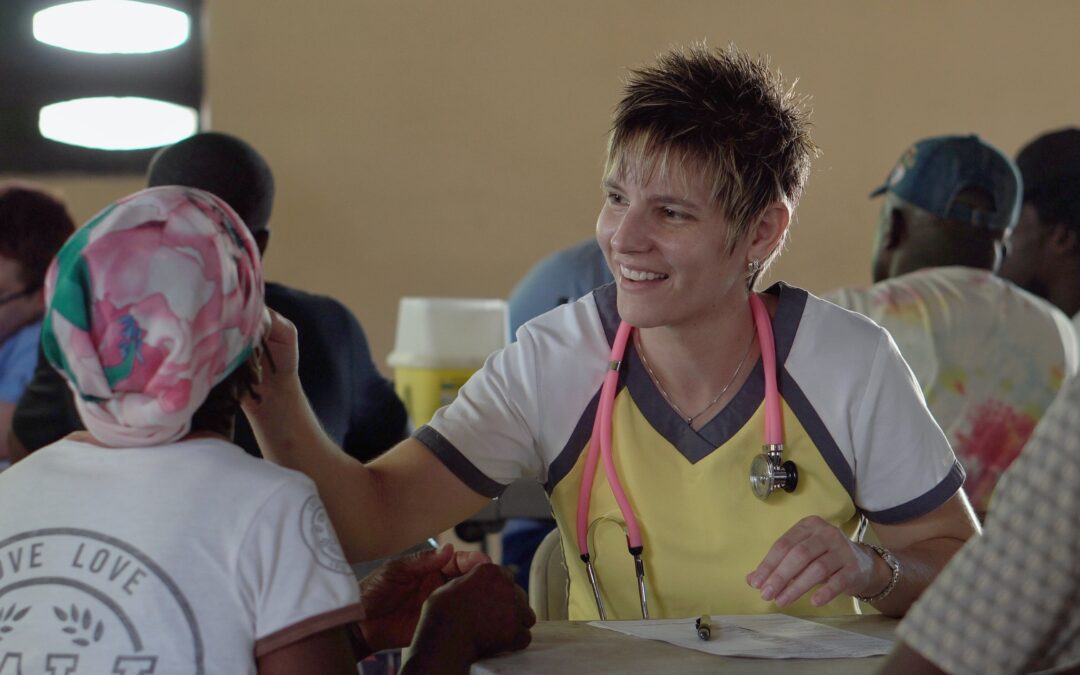
by Mission Partners For Christ | Jul 22, 2022 | What We Do
Each year thousands of volunteers travel around the world to care for people with little or no access to adequate medical care.
Nonprofit organizations like Mission Partners for Christ specialize in organizing teams to provide free care, often in remote locations where there are no local physicians. For the people who live in these areas, our free clinics are their only opportunity to receive health screenings, preventative care, and medical treatments without traveling great distances. Our volunteers also teach clinic visitors about hygiene and nutrition and offer dental and vision screenings. When we leave the USA, our bags are packed with over-the-counter medications, treatment supplies, and vitamins to distribute to local families who need them.
As a Christian medical missions organization, we know that we bring more than medical care to our free clinics.
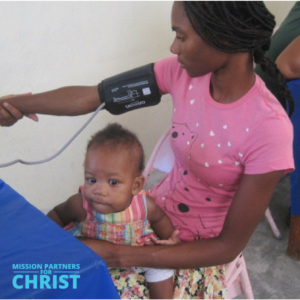 We bring hope and eternal healing that can only be found in Jesus Christ. We partner with local faith-based agencies to help community members connect with local Christians who will mentor them as they learn more about the Gospel.
We bring hope and eternal healing that can only be found in Jesus Christ. We partner with local faith-based agencies to help community members connect with local Christians who will mentor them as they learn more about the Gospel.
Mission Partners for Christ relies heavily on physicians, nurses, techs, and other medical providers to volunteer their expertise in our temporary clinics. None of our medical providers receive payment for their services, everyone volunteers their time and pays for their own travel. Unlike other organizations, Mission Partners for Christ does not add administration or supply fees to the travel expenses. These are covered by individual and corporate donations from across the country.
It may surprise you to know a large number of volunteers are not medical providers. Our medical missions teams provide basic health education, weigh and measure our patients, and distribute free supplies. There are plenty of jobs to do and we welcome people from all professions to serve on our teams.
Still have more questions about what our medical mission teams do?
Send us a quick message here so our team can answer your questions about medical missions and how you can be a part of them! If you are ready to serve, we can carve out the perfect place on our team where you can have the greatest impact!
See you in the mission field!

Sheri Postma, RN
Founder & CEO
Mission Partners for Christ
MissionPartnersforChrist.com
Facebook.com/MissionPartnersforChrist
Twitter.com/mission_partner
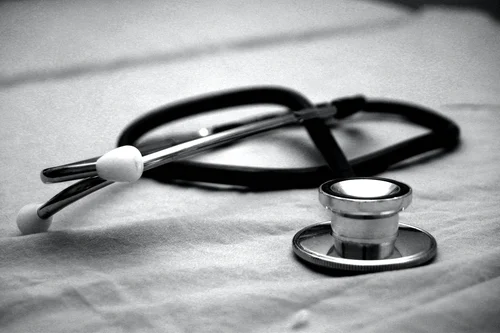
by Mission Partners For Christ | Apr 9, 2022 | What We Do
Doctors in medical missions are not all cut from the same cloth; they come from
different countries, backgrounds, and cultures. However, they are all moved by a common purpose: serving Jesus through caring for the sick and the wounded. Let’s take a moment today to meet just a few of these people.
Dr. Priscilla Busyingye, Uganda
Dr. Busyingye is a unique woman. As an African nun, the women of Uganda are her mission field. Trained as an OB-GYN and a fistula repair surgeon by the Catholic Banyatereza Sisters of Uganda, Dr. Busyingye currently serves as the president of the Association of Obstetricians and Gynecologists of Uganda, where her influence can impact many people. In 2020, Dr. Busyingye became the first African woman to win the Gerson L’Chaim Initiative award. This award came with a $500,000 prize that She will put towards expanding the Rwibaale Health Center, where she works to save lives every day as a medical missionary.
Source: African Mission + Healthcare
Dr. Tan Lai Yong, Singapore
Dr. Tan did not envision himself going into medicine when he was young. Due to his grades in school, he believed that medical school was not an option. After being encouraged by a platoon mate during his time as an infantry soldier in the Singapore Armed Forces, Dr. Tan decided to take a leap of faith and apply to medical school.
Through the course of his career, Dr. Tan has turned down multiple prestigious career opportunities to serve the poor, the imprisoned, and the marginalized populations of Singapore and China. Currently, Dr. Tan works at the College of Alice and Peter Tan, part of the University of Singapore. He teaches his students the importance of understanding marginalized communities within Singapore. Through his work with the school, he is preparing the next generation of medical students to carry on the work he started. The love of God continually motivates Dr. Tan to do his work. In an interview, he once shared, “when we embrace God’s covenant, God always directs us back to the community to receive help, to share, to exercise compassion, and to find hope.”
Source: National Healthcare Group and Salt and Light
Dr. Chiara Castellani, Democratic Republic of Congo
Dr. Castellani has dedicated her life to serving in medical missions. Before moving to the Democratic Republic of Congo, where she currently resides, this highly trained surgeon also put her life-saving skills to work in Nicaragua. She has managed a hospital in Kimbau, DRC for over 30 years as a medical missionary. Dr. Castellani has worked on countless cases with people who suffer from Ebola, leprosy, and illnesses related to poverty and lack of access to medical care. The greatest joy in her work is seeing how God uses her skills as a surgeon to bring healing into people’s lives. She will often speak of how God is in control of the outcome even in the most desperate and impossible cases.
As of 2019, Dr. Castellani was working with doctors from Trieste to build a Mother and Child Health Center in Buzala to continue her life-saving work.
Source: SouthWorld
Dr. Tongai Chitsamatanga, Zimbabwe
In a country of more than 15 million people, Dr. Chitsamatanga is one of two pediatric surgeons. Trained and practiced in hospitals in the United Kingdom and Africa, Dr. Chitsamatanga now works for a Zimbabwean hospital started by the medical mission nonprofit, CURE International. CURE Zimbabwe is in Bulawayo, the second-largest city in the nation; the hospital is also the only location where children with complicated orthopedic conditions can be treated. At only 41 years old, Dr. Chitsamatanga has dedicated his life to caring for children who otherwise would likely never receive medical treatments as a medical missionary, and he intends to keep going. Remarking on his work and the feedback he’s gotten from his patients, Dr. Chitsamatanga says, “‘This is exactly what the Lord wants at this moment in time. This is why I’m here.”
Source: Christianity Today
Dr. Jason Fader, Burundi
The inaugural winner of the Gerson L’Chaim Prize, Dr. Fader’s passion comes from being the hands of Christ to his patients in Burundi. As of 2017, Dr. Fader was just one of just 14 surgeons in all of Burundi. His work at Kibuye Hope Hospital, the teaching hospital for Hope Africa University Medical School, has been life-changing for each patient who has sought his medical expertise. Dr. Fader has been instrumental in expanding medical facilities and training new staff.
Source: Free Methodist World Missions
Did you meet some new people in this week’s article? Did any of these doctors inspire you to think about medical missions differently? Let us know your thoughts in the comments!

by Mission Partners For Christ | Apr 11, 2017 | How to Prepare
Packing for an overseas mission trip is much different than packing for an extravagant tour across Europe.
You must think about the conditions of the area you are visiting and realize that you can’t purchase supplies when you arrive, so it’s necessary to bring everything along! Plus, your purpose in attending a medical mission’s trip is to volunteer your time. Therefore, you aren’t left with much time to shop for what you forgot back home. You will be working rain or shine, hot or cold, so you must be prepared for all circumstances. Travel to a third-world country can be comparable to camping, so think like a camper, and you’ll be golden!
Also, it’s common to leave much of what you bring behind.
The communities you will work with need those items much more than you do, so pack items you don’t mind letting go and maybe a little extra to give as gifts!
Here is a comprehensive list of what to pack for your medical mission’s trip:
Bring On You
This part of the list includes the most important things you need to carry attached to you — the things you absolutely don’t want to lose or forget. This can be kept in a small purse or a pouch attached to your belt or waist. Attaching these things to you ensures they will not get lost!
- Passport
- Visa
- Photo ID
- Currency/Debit card
- Trip itinerary
- Flight tickets
- Hotel confirmation
- Immunization records
- Cell-phone
- List of important phone numbers
Bring In Carry-On
Checked baggage always has a chance of getting lost or being riffled through upon arrival. I remember going overseas and having the crew at the baggage claim go through my checked luggage only to poke holes in ALL of my instant oatmeal packets. Every piece of clothing was covered in powdery oats. To avoid this issue, keep any “explosive” items like food and toiletries in your carry-on.
- Backup copies of important documents
- Solar power charger
- Laptop and charger
- Camera
- Snacks
- Water bottle
- Sunscreen
- One change of clothes
- Toiletry kit (make sure all toiletries meet TSA size requirements)
- Sunglasses
- First-aid kit
- Flashlight/headlamp
- Insect repellant
- Antibacterial wipes
- Journal and pen
- Malaria pills
- Other important personal medications
- Travel Converter/Adapter
Bring In Suitcase
There’s no telling what your journey will be like once you land. You may have an easy drive to your destination or may have to carry your luggage a long distance. Make sure to pack your supplies in easy to transport luggage with TSA approved luggage tags. This will make luggage transportation a breeze and decrease the chances of your luggage disappearing.
- Water purifier/tablets
- Snacks (non-perishable)
- Daypack with waterproof cover
- Mosquito net
- Ziploc bags
- Bilingual dictionary
- Quick-dry towel
- Underwear
- Socks
- Rainboots
- Raincoat
- Comfortable shoes
- Flip flops
- Gloves (both for warmth and for medical purposes)
- Sun hat/ visor/ bandana
- Base/mid/top layers
- Pants or long skirts
- Short/long sleeve shirts
- Scrubs
- Medical supplies (specific for trip)
- Gifts for families and children (stickers, toiletry items, crayons, etc.)
Though it looks like a long list, each item listed is important and should be considered when you’re packing for your next mission trip!
Showing up prepared will take the focus off your own needs and put the focus on those you are there to serve.
 See you in the mission field!
See you in the mission field!
Sheri Postma, RN
Founder & CEO
Mission Partners for Christ
MissionPartnersforChrist.com
Facebook.com/MissionPartnersforChrist
Twitter.com/mission_partner


 When you join a medical missions team, it’s normal for participants to pay for flights, accommodations, and food during the trip. Most organizations (but not us!) also ask participants to pay extra to cover the supplies needed to conduct medical exams or to leave with the patients.
When you join a medical missions team, it’s normal for participants to pay for flights, accommodations, and food during the trip. Most organizations (but not us!) also ask participants to pay extra to cover the supplies needed to conduct medical exams or to leave with the patients.  In the US we often have more than enough resources and an optimal environment to treat patients. When volunteers put their skills to use in less than ideal conditions with little resources, they are developing their skill sets, providing great care, and gaining a positive learning experience in the process.
In the US we often have more than enough resources and an optimal environment to treat patients. When volunteers put their skills to use in less than ideal conditions with little resources, they are developing their skill sets, providing great care, and gaining a positive learning experience in the process.



 We bring hope and eternal healing that can only be found in Jesus Christ. We partner with local faith-based agencies to help community members connect with local Christians who will mentor them as they learn more about the Gospel.
We bring hope and eternal healing that can only be found in Jesus Christ. We partner with local faith-based agencies to help community members connect with local Christians who will mentor them as they learn more about the Gospel.

 See you in the mission field!
See you in the mission field!
